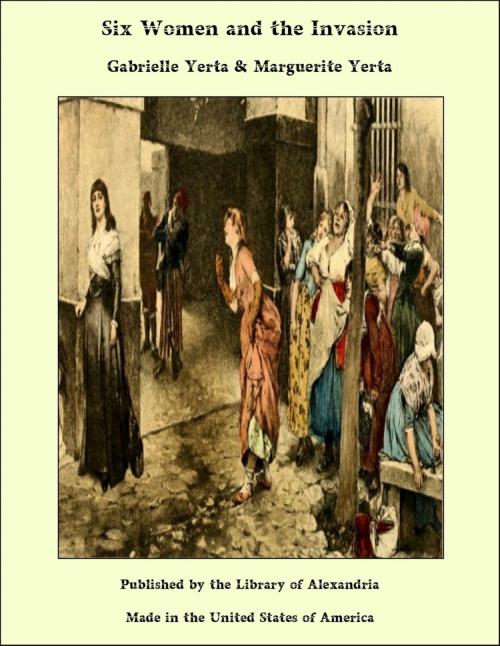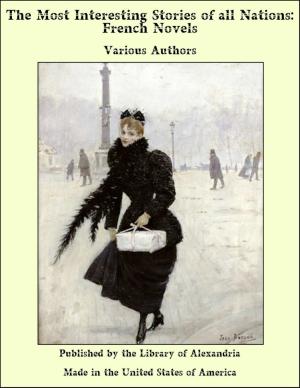Six Women and the Invasion
Nonfiction, Religion & Spirituality, New Age, History, Fiction & Literature| Author: | Gabrielle Yerta & Marguerite Yerta | ISBN: | 9781465612410 |
| Publisher: | Library of Alexandria | Publication: | March 8, 2015 |
| Imprint: | Language: | English |
| Author: | Gabrielle Yerta & Marguerite Yerta |
| ISBN: | 9781465612410 |
| Publisher: | Library of Alexandria |
| Publication: | March 8, 2015 |
| Imprint: | |
| Language: | English |
As you know only too well, in the year 1914 war set Europe on fire. That is to say, you the men made war, and we the women had but to comply. Let us be honest and true: whereas you, heart of my heart, now gone to fight for your country, wished for this contest with the enthusiasm, spirit, and rage of youth, I wished for it too, but with terror, anguish, and remorse. Such is the difference. The Place? The Île de France, the part of my country blessed among all, sweeter to my eyes than the most loudly sung; and in the Île de France, Morny, a village of the Laonnois, situated on a level plain. At ten miles' distance, to the west of Morny, Laon is perched on a steep low hill. To the north, fields and meadows stretch out as far as the eye can reach, and towards the south, the forest of St. Gobain makes a long dark blot on the landscape; beyond, a blue line of mountains closes the horizon like a wall. This peaceful scene, with its green meadows, fertile fields, rich forests, villages nestling among orchards, with its good-humoured tenants wrapt up in a love of their country, sums up the treasures of the Île de France. But it is also "the seasoning of the French pie, this rotten ferment whose canker-like nature, frivolity, inconstancy, and folly, have spread into the noblest parts of France." You were not aware of this? No more was I, but I learned it from Hummel's Geography, published in 1876 for "German families," and it is a conviction that Teutonic babies imbibe with their mothers' milk. The dramatis personae? Six women, I have said. My mother-in-law, her four daughters, and I. Let me introduce them. Mme. Valaine, my mother-in-law, charms by her gentle dignity and by her handsome face, still young under waving grey hair. As to her daughters, when they all were little girls in pinafores, an old woman once cried out at the sight of their childish beauty, "One is prettier than another." To which my husband—at that time a teasing schoolboy—retorted, "One is naughtier than another." We do not believe this last assertion. I will only maintain that their beauty has grown with them. Geneviève, the eldest, is my favourite sister, another me; and for a long while we have not been able to do without one another. A supple shape, a lovely expressive face fringed with golden hair, clear eyes between black eyelashes, added to a fine intellect and well-poised faculties, make of her a privileged being. Her steadfast character always deals straightforwardly, whereas mine, just as tenacious, does not disdain manœuvring.
As you know only too well, in the year 1914 war set Europe on fire. That is to say, you the men made war, and we the women had but to comply. Let us be honest and true: whereas you, heart of my heart, now gone to fight for your country, wished for this contest with the enthusiasm, spirit, and rage of youth, I wished for it too, but with terror, anguish, and remorse. Such is the difference. The Place? The Île de France, the part of my country blessed among all, sweeter to my eyes than the most loudly sung; and in the Île de France, Morny, a village of the Laonnois, situated on a level plain. At ten miles' distance, to the west of Morny, Laon is perched on a steep low hill. To the north, fields and meadows stretch out as far as the eye can reach, and towards the south, the forest of St. Gobain makes a long dark blot on the landscape; beyond, a blue line of mountains closes the horizon like a wall. This peaceful scene, with its green meadows, fertile fields, rich forests, villages nestling among orchards, with its good-humoured tenants wrapt up in a love of their country, sums up the treasures of the Île de France. But it is also "the seasoning of the French pie, this rotten ferment whose canker-like nature, frivolity, inconstancy, and folly, have spread into the noblest parts of France." You were not aware of this? No more was I, but I learned it from Hummel's Geography, published in 1876 for "German families," and it is a conviction that Teutonic babies imbibe with their mothers' milk. The dramatis personae? Six women, I have said. My mother-in-law, her four daughters, and I. Let me introduce them. Mme. Valaine, my mother-in-law, charms by her gentle dignity and by her handsome face, still young under waving grey hair. As to her daughters, when they all were little girls in pinafores, an old woman once cried out at the sight of their childish beauty, "One is prettier than another." To which my husband—at that time a teasing schoolboy—retorted, "One is naughtier than another." We do not believe this last assertion. I will only maintain that their beauty has grown with them. Geneviève, the eldest, is my favourite sister, another me; and for a long while we have not been able to do without one another. A supple shape, a lovely expressive face fringed with golden hair, clear eyes between black eyelashes, added to a fine intellect and well-poised faculties, make of her a privileged being. Her steadfast character always deals straightforwardly, whereas mine, just as tenacious, does not disdain manœuvring.















